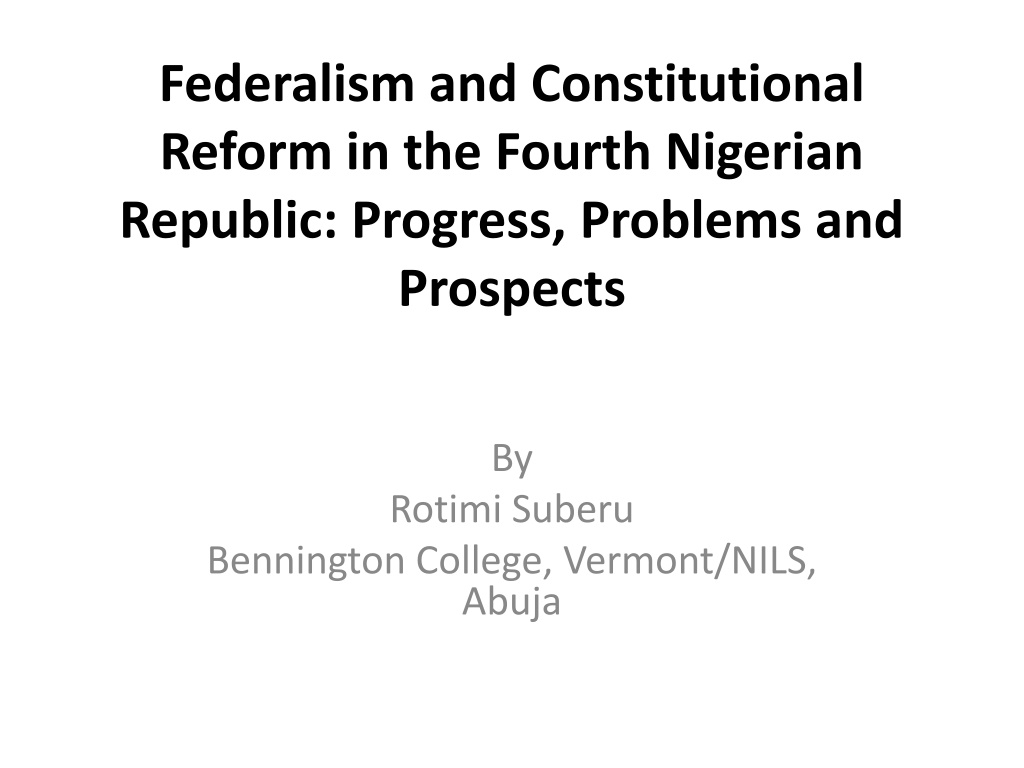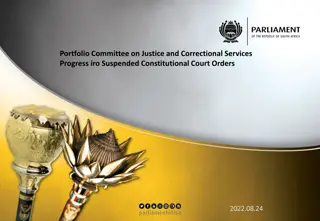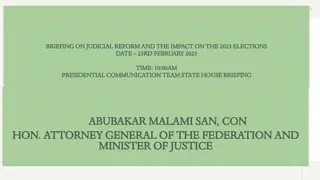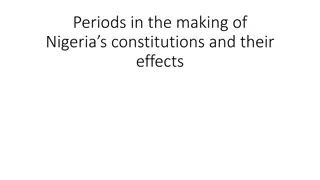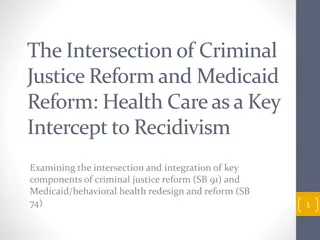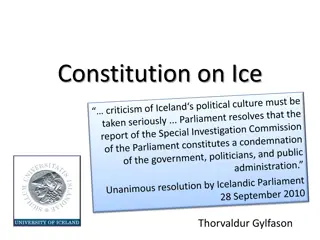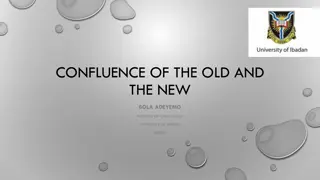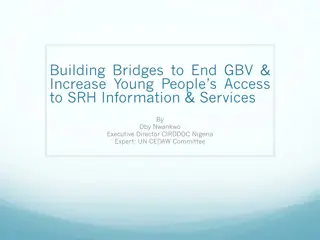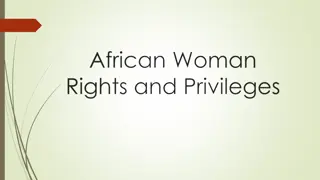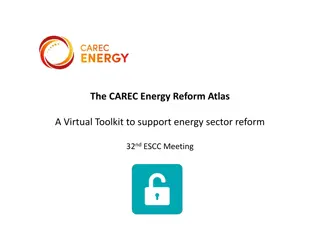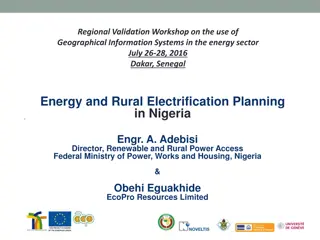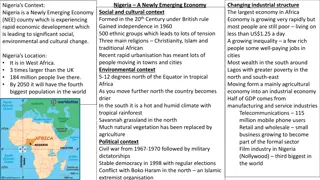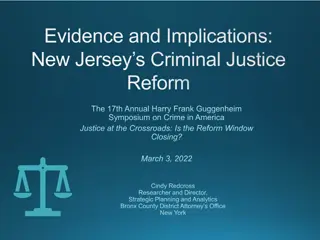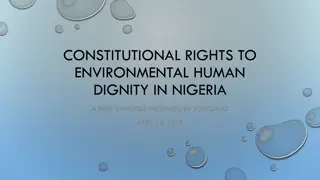Challenges of Constitutional Reform in Nigeria: A Comprehensive Analysis
Delve into the complexities of Nigeria's constitutional reform efforts since the Fourth Republic began in 1999. Explore the structural, institutional, and historical drivers of constitutional conflict, from a deeply divided society to issues of federalism and ethnic autonomy. Assess the challenges and prospects for achieving meaningful constitutional change in Nigeria.
Download Presentation

Please find below an Image/Link to download the presentation.
The content on the website is provided AS IS for your information and personal use only. It may not be sold, licensed, or shared on other websites without obtaining consent from the author. Download presentation by click this link. If you encounter any issues during the download, it is possible that the publisher has removed the file from their server.
E N D
Presentation Transcript
Federalism and Constitutional Reform in the Fourth Nigerian Republic: Progress, Problems and Prospects By Rotimi Suberu Bennington College, Vermont/NILS, Abuja
Background Intense but Ineffective Constitutional Politics Since 1999 Constitutional Reform Agendas (True Federalism) Constitutional Review Bodies Constitutional Conferences/Public Hearings Constitutional Amendments New Constitutional Blueprints But No Significant Federal Constitutional Change
Objectives Analyze Structural and Institutional Drivers of Constitutional Politics and Activism Discuss Contending Political, Civic, and Ethnic Perspectives on Change Analyze the 2010-11 Constitutional Alterations Review the 2014 National Conference and Constitution (4thAlteration) Bill Discuss Prospects for More Stable Constitutional Politics
Drivers/Sources of Nigerias Constitutional Conflict A Deeply Divided Society A History of Constitutional Illegitimacy A Legacy of Centrist Constitutional Policymaking State Failure Syndromes New International/global Norms Participatory Constitutionalism Ethnic Autonomy
A Deeply Divided Federation Multinational vs. Mono-national Federal States Conflicting Inter-Group Visions of the State Recurrent Agitations for Communal Empowerment and Recognition Lack of Consensus on Constitutional Reform Agendas
A Deeply Divided Federation Mistake of 1914? Devolution/Autonomy Demands States Reorganization Demands Minority Language Rights Natural Resource Control Ethnic Indigenes vs. Settlers State and Religion
A Legacy of Undemocratic Constitutional Policymaking None of the Nigerian Constitutions since 1914 can be described as an act of the people, in the sense of being made by them either directly in a referendum or through a fully sovereign constituent assembly of elected representatives (Ogowewo 2000, 138). The true originators of the Nigerian Constitutions are not We the People but colonial rulers, military dictators or ruling cliques (Enahoro)
A Legacy of Undemocratic Constitutional Policymaking The 1999 Constitution is a sham, a militarist contraption, a palpable aggression against civic allegiance, and deserving of no allegiance from the people (Soyinka 2007). Colonial Constitutions Negotiated Between Colonial officials and a tiny nationalist elite. In the Postcolonial era military dictators became the country s main constitutional architects and promulgators.
A Legacy of Undemocratic Constitutional Policymaking No Consensus on How to Democratize the Nigerian Constitution; Constitutional Amendment/Review by the National Assembly? Elected Constituent Assembly or Constitutional Conference? Sovereign National Conference? Constitutional Referendum or Plebiscite?
Military/Unitary Federalism, Unitary State in Federal Disguise Pre-Military Federalism Three powerful (albeit unequal) regions separate constitutions (local governance or administration, local police departments, autonomous revenues, largely independent judicial and electoral administrations, and even regionally based political parties). Westminster Parliamentary system, collegiate federal executive, ceremonial president, prime minister responsible to the parliament.
Unitary State in Federal Disguise Current Post-Military Federalism Smaller/Weaker States centralized local government, electoral, judicial and police structures sectional parties outlawed independent subnational constitutions eliminated strong executive presidential system of government Oil-based Fiscal Centralism/Distributive Federalism
Dysfunctional Federation/Failing State governmental corruption and dysfunction inter-group grievances and discrimination uneven socio-economic development widespread violence and conflict internal displacement human flight and brain drain environmental pollution or despoliation loss of territorial control to active insurgencies
Dysfunctional Federation/Failing State Corrupt oil revenue devolution scheme aggravates conflict; Niger Delta, Boko Haram Imperial, but parochial, super-presidency undermines democracy and promotes electoral authoritarianism States have failed to support national macroeconomic reform initiatives, drive national economic prosperity, develop into laboratories of economic policy innovation, or function as instruments of effective service delivery
Participatory Constitutionalism The global rise of the ethos of constitutional populism has inspired extensive public participation in the drafting, negotiation, and/or ratification of the constitutions of many countries, including Nigeria s direct neighbors like Benin and Niger, which held landmark, bottom-up Sovereign National Conferences in the 1990s We in Nigeria, the giant of Africa, should not continue to pride ourselves as a democracy until we have democratized our constitution in line with the world wide movement towards the democratization of the constitution (Nwabueze, 2014)
Global Wave of Communalism There has been a global a wave of communal freedom in which national, ethnic, racial, linguistic, and religious communities have asserted autonomy and equality claims, leading to the dissolution of the three post- communist federations of Czechoslovakia, USSR, and Yugoslavia (Kincaid 2012, 43). This global wave of communalism inspired many Nigerian ethnic groups to proclaim themselves as nationalities and to advance demands for federalist recognition, autonomy and self-determination.
Official Constitutional Review Bodies Presidential Committee on the Review of the Constitution (PCRC), National Political Reform Conference (NPRC), the Electoral Reform Committee (ERC), Presidential Committee on the Review of Outstanding Issues from Recent Constitutional Conferences, Presidential Advisory Committee on the National Conference and the 2014 National Conference NASS Joint Committee on Constitutional Review (JCCR)
Official Constitutional Review Acceptance of the constitutional amendment procedure specified under the 1999 Constitution Modest, rather than fundamental, changes to the current federal system significant disagreements over issues like status of local government & tenures of chief political executives Political Manipulation of Constitutional Reform
Civil Society/CFCR Official constitutional review process is shallow, elitist, restrictive, non-inclusive, non- participatory, non-transparent, inaccessible, illegitimate. National conference/national referendum on the Nigerian constitution are essential. More Balanced Federalism Relatively Strong Federal Government.
The Ethnic Nationalists The Right of Ethnic Groups to Self- determination up to the point of secession Ethnic-Based Constituent Units Centrifugal Federalism Regionalization of security services Parliamentary Government Critiqued in the north as a scheme to wreck the federation.
The 2010-11 Constitutional Amendments Followed the momentum for reform engendered by the failed 2007 elections Involved three rounds of constitutional alterations Focused primarily on electoral reform Constitutionalized the National Industrial Court Reinforced the centralization of the federation Critiqued by civic and ethnic activists as half- hearted, ineffective, tinkering with the constitution
2014 National Conference Attended by 492 delegates Dominated by the Political-Military Class, Civil Society, and Regional and Ethnic Nationality Organizations Political and Fiscal Decentralization State Police, Constitutions, Court of Appeal State Creation Local Government Reform
2014 National Conference .Residency Rights vs. Indigene-ship .Modified Presidential System .Enhanced Independence for Key Regulatory Agencies .Power Sharing .Referendum .Other Recommendations: SWF, Mayor for FCT, Role for Traditional Rulers, Part-Time Legislature, Reduced Governance Costs, Independent Candidacy, Role for Traditional Rulers, Rejection of Immunity, Social Citizenship .Recommendations critiqued as lacking feasibility, viability or even rationality.
Constitution (4thAlteration) Bill Some Overlaps with National Conference Recommendations Elimination of SIECs Democracy, Fiscal Autonomy, and Fixed Tenure for Local Councils Amended/Abridged Federal Exclusive Legislative List Clarified State Creation Rules
Constitution (4thAlteration) Bill Advisory Role for Traditional Rulers Autonomy for Key Regulatory Agencies Fundamental Rights to Basic Education and Health Care. Independent Candidacy But Major Differences with National Conference Recommendations
Constitution (4thAlteration) Bill Does not embrace state police, constitutions, court of appeal; modified presidential system; delisting of LGAs; popular referendum Unambiguously Upholds Residency Rights Legislative Empowerment Rather than Federalist Agenda Removes President s Assent as Requirement for Constitutional Amendment, Powers to Modify or Adapt Legislation, and Ability to Delay Implementation of Legislation
Constitution (4thAlteration) Bill Financial Autonomy for State Legislatures National and State Assembly Service Commissions Life Pension for Heads of Legislative Houses Membership of Council of State for Past Senate Presidents and House Speakers Major Critiques: Self-Serving; Neglect of Conference Report; Proposals for LG Autonomy Likely to Suffer Resistance or Rejection By State Legislatures and Executives.
Resolving Nigerias Federal Constitutional Reform Conundrum Nigeria faces a conundrum arising from the deep dysfunctions in the operation of its federal system, and the absence of consensus behind fundamental constitutional change The conservatism of the political class, the idealistic populism of the CFCR and the chauvinism of the ethnic nationalists stand in the way of constitutional reform consensus Need to bridge gap between the reform need and the reform capacity of the federal system
Resolving the Conundrum Wholesale replacement of the 1999 Constitution is unfeasible and undesirable. 1999 constitution contain features that are institutionally judicious and broadly legitimate These include multiple constituent states, fragmentation major ethnic groups, prohibition of openly sectional parties, establishment of consociation-style federal character rules and a potentially integrative center .
Resolving the Conundrum Focused Constitutional Amendments Legislative Supplementation Judicial Arbitration Constitutional Infidelity and Other Strategies of Creative Non-Constitutional Innovation or Renewal
Focused Constitutional Amendments Build on the Achievements of the 2010-11 Amendments Implement Focused Reforms in Key Priority Areas Insulate and strengthen key regulatory/ oversight federal executive institutions , including the Independent National Electoral Commission, Revenue Mobilization and Allocation Commission, Federal Character Commission, and the Police Service Commission Adopt the Uwais Model on INEC
Legislative Supplementation Build on the Broad Powers of the National Assembly over Revenue Sharing, e.g. Allocation of Revenue (Abolition of Dichotomy in the Application of Principle of Derivation) Act 2004 Shift from unconditional to conditional matching grants scheme in the sharing of the Federation Account (Soludo) Circumvent corruption, link revenue allocation to social provisioning and good governance, and address destabilizing socio-economic disparities within and between states/regions of the federation.
Judicial Arbitration Since 1999, the Supreme Court has arbitrated numerous disputes over revenue allocation, local governance, public order, and electoral matters (Suberu 2008). Time and again our recourse to the Courts won us more constitutional victories than the National Assembly s majority was able to secure for itself by legislation. By and large, the battle for a truly federal state has been fought not in the chambers of the National Assembly but in the hallowed halls of the Supreme Court (Tinubu 2011, 7). Active judicial arbitration will be more of a boon, than a bane, to Nigeria s federal democratic aspirations.
Constitutional Infidelity Constitutional infidelity refers to constitutionally important change that occurs when political elites or others act in disregard or defiance of a constitution without abrogating the document (Kincaid 2012). Moderate Sharia Law Implementation Excess Crude Account (ECA) and Nigeria Sovereign Wealth Authority
Other Creative Non-Constitutional Initiatives Constitutional Infidelity or Salutary practices that exist on the margins of constitutionality North-South rotation of the presidency Establishment by the states of local government bodies other than the 774 explicitly designated in the Constitution, Proliferation of various sub-nationally funded or maintained law-enforcement or quasi-police units Growing formalization of the six geo-political zones as bases of federalist coordination, administration and representation beyond the states.
Conclusion The quest for a fundamental restructuring of the 1999 federal constitutional architecture has remained unfulfilled in the absence of enthusiasm for fundamental change among the political class or of consensus on reform across the federation s ethnic, religious and regional fault-lines. But if mega-constitutional change is unfeasible, the perpetuation of the current dysfunctional system of federalism is unsustainable and undesirable. Incremental constitutional change and creative non-constitutional renewal recommend themselves as a pathway out of Nigeria s current federal conundrum and political predicament.
